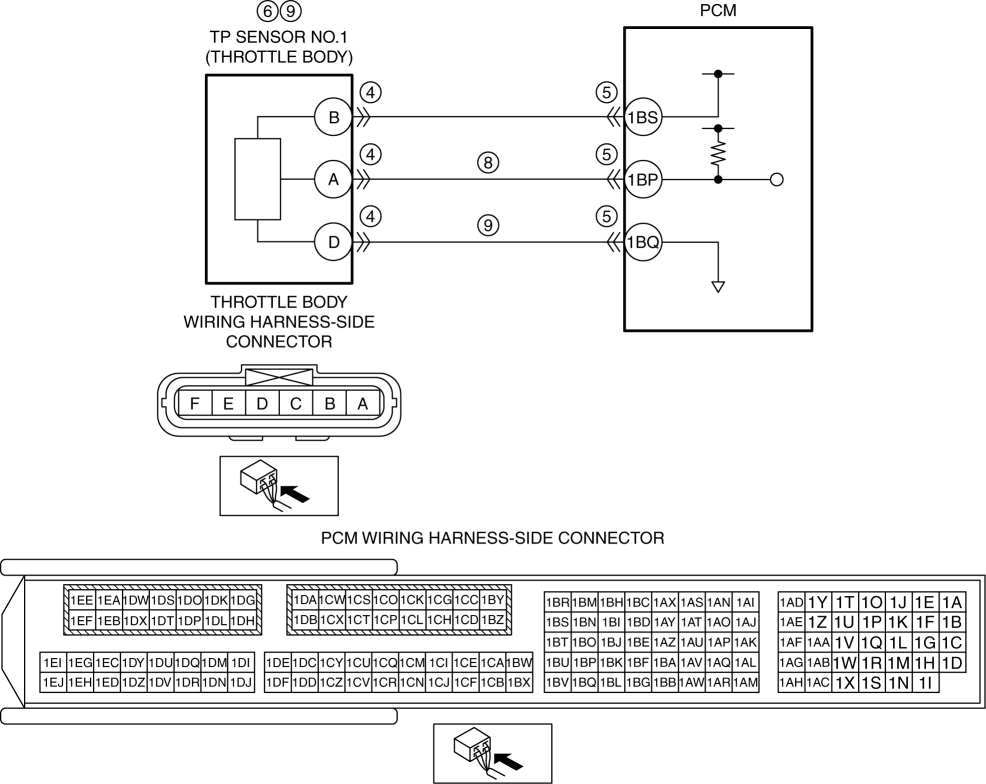|
|
| STEP | INSPECTION | ACTION |
| 1 | VERIFY FREEZE FRAME DATA (MODE 2)/SNAPSHOT DATA HAS BEEN RECORDED
| Yes | Go to the next step. |
| No | Record the FREEZE FRAME DATA (Mode 2)/snapshot data on the repair order, then go to the next step. |
| 2 | VERIFY RELATED REPAIR INFORMATION AVAILABILITY
| Yes | Perform repair or diagnosis according to the available repair information.
|
| No | Go to the next step. |
| 3 | DETERMINE IF TP SENSOR NO.1 OR WIRING HARNESS MALFUNCTION
| Yes | Go to Step 7. |
| No | Go to the next step. |
| 4 | INSPECT THROTTLE BODY CONNECTOR CONDITION
-
Switch the ignition off.
-
Disconnect the throttle body connector.
-
Inspect for poor connection (such as damaged/pulled-out pins, corrosion).
-
Is there any malfunction?
| Yes | Repair or replace the connector and/or terminals, then go to Step 10. |
| No | Go to the next step. |
| 5 | INSPECT PCM CONNECTOR CONDITION
-
Disconnect the PCM connector.
-
Inspect for poor connection (such as damaged/pulled-out pins, corrosion).
-
Is there any malfunction?
| Yes | Repair or replace the connector and/or terminals, then go to Step 10. |
| No | Go to the next step. |
| 6 | INSPECT TP SENSOR NO.1
| Yes | Replace the throttle body, then go to Step 10. (See INTAKE-AIR SYSTEM REMOVAL/INSTALLATION [SKYACTIV-G 2.5].) |
| No | Go to Step 10. |
| 7 | DETERMINE IF TP SENSOR NO.1 SIGNAL CIRCUIT OR TP SENSOR NO.1 GROUND CIRCUIT MALFUNCTION
-
Switch the ignition off.
-
Disconnect the throttle body connector.
-
Access the TP1 PID using the M-MDS. (See ON-BOARD DIAGNOSTIC TEST [SKYACTIV-G 2.5].)
-
Verify the TP1 PID value.
-
Is the TP1 PID value 5 V or B+?
| Yes | Go to the next step. |
| No | Go to Step 9. |
| 8 | INSPECT TP SENSOR NO.1 SIGNAL CIRCUIT FOR OPEN CIRCUIT
-
Verify that the throttle body connector is disconnected.
-
Switch the ignition off.
-
Disconnect the PCM connector.
-
Inspect for continuity between throttle body terminal A (wiring harness-side) and PCM terminal 1BP (wiring harness-side).
-
Is there continuity?
| Yes | Refer to the wiring diagram and verify whether or not there is a common connector between throttle body terminal A and PCM terminal 1BP.
If there is a common connector:
-
Determine the malfunctioning part by inspecting the common connector and the terminal for corrosion, damage, or pin disconnection, and the common wiring harness for a short to power supply.
-
Repair or replace the malfunctioning part.
Go to Step 10. |
| No | Refer to the wiring diagram and verify whether or not there is a common connector between throttle body terminal A and PCM terminal 1BP.
If there is a common connector:
-
Determine the malfunctioning part by inspecting the common connector and the terminal for corrosion, damage, or pin disconnection, and the common wiring harness for an open circuit.
-
Repair or replace the malfunctioning part.
Go to Step 10. |
| 9 | INSPECT TP SENSOR NO.1 GROUND CIRCUIT FOR OPEN CIRCUIT
-
Verify that the throttle body connector is disconnected.
-
Switch the ignition off.
-
Disconnect the PCM connector.
-
Inspect for continuity between throttle body terminal D (wiring harness-side) and PCM terminal 1BQ (wiring harness-side).
-
Is there continuity?
| Yes | Replace the throttle body, then go to the next step. (See INTAKE-AIR SYSTEM REMOVAL/INSTALLATION [SKYACTIV-G 2.5].) |
| No | Refer to the wiring diagram and verify whether or not there is a common connector between throttle body terminal D and PCM terminal 1BQ.
If there is a common connector:
-
Determine the malfunctioning part by inspecting the common connector and the terminal for corrosion, damage, or pin disconnection, and the common wiring harness for an open circuit.
-
Repair or replace the malfunctioning part.
Go to the next step. |
| 10 | VERIFY DTC TROUBLESHOOTING COMPLETED
| Yes | Repeat the inspection from Step 1.
Go to the next step. |
| No | Go to the next step. |
| 11 | VERIFY AFTER REPAIR PROCEDURE
| Yes | Go to the applicable DTC inspection. (See DTC TABLE [SKYACTIV-G 2.5].) |
| No | DTC troubleshooting completed. |
